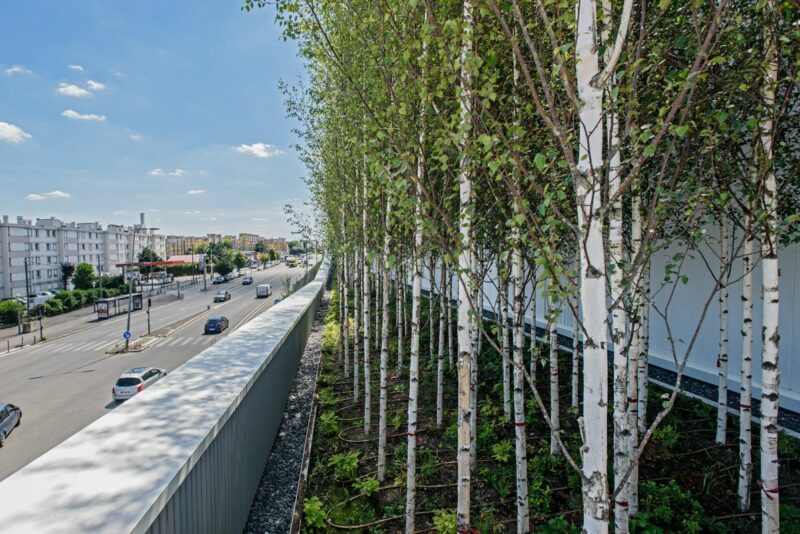Anticipating trends in the energy market and keeping costs under control
1. Legal constraints are increasing
By 2030, France aims to generate 40% of its electricity from renewable sources. Businesses have already taken steps to overhaul and decarbonise their production methods. But to achieve the ambitious nationwide target, all businesses – including the medium-sized and even the very small – must join in the effort.
What’s in store for existing buildings (starting 1 January 2028)
By 2028, non-residential buildings above 500 m² must include – over a legally specified surface area – one of the following:
- a renewable energy generation process
- a revegetation programme
- or another system of equivalent impact
These requirements apply to retail, logistics, industrial, production and administrative buildings, offices, warehouses, hospitals, sports facilities, schools and universities, as well as covered car parks with a footprint of over 500 m².
The rules for new buildings (as of 1 July 2023)
New buildings of more than 1,000 m² must devote 30% of their roofs or car park shading to green areas or renewable energy generation systems. The French Climate and Resilience Act came into force in July 2023.
As a result, new buildings, extensions and major renovations must involve revegetation or renewable energy generation systems covering 30% of their roofs or car park shadings. These constraints apply to:
- Retail, logistics, industrial, administrative and production buildings, offices, hospitals, sports and leisure facilities, schools & universities, and covered car parks over 500 m².
- Office buildings larger than 1000 m².
From January 2025, most new and extensively renovated non-residential buildings over 500 m² will be affected. They will have to incorporate revegetation or renewable energy generation equipment on a part of their roofs, rising to 50% from July 2027.
2. How regulatory requirements affect the stability and forecasting of your costs
Every year, the law requires the implementation of increasingly restrictive measures, with a long-term view of achieving the buildings’ self-sufficiency.
Using roofs to grow plants and produce solar energy is one of the solutions you can adopt to comply with this legal requirement. These measures diversify our energy sources while promoting sustainability. It’s crucial to apply them to areas that are already sealed with man-made coverings, rather than agricultural or forest land. Integrating nature into the urban environment is essential to preserve biodiversity and keep cities cooler in the summer.
Solutions to minimise your building’s impact
- Thermal insulation considerably benefits temperatures inside buildings, reducing heating & cooling costs.
- Over-roofing extends the roof’s lifespan, providing durable protection against the elements and cutting long-term maintenance costs.
- Rainwater regulation prevents flooding thanks to efficient collection, contributing to the sustainable management of water resources.
- Preserving biodiversity on roofs maintains the ecological balance, promotes the harmonious coexistence of species and contributes to the health of ecosystems, bringing valuable benefits to the environment.
3. Well-managed buildings support sustainability and cost predictability
GSE helps you comply with legal requirements and succeed in your sustainability strategy. We specialise in eco-responsible construction and have decades of experience in France and Europe. Throughout your project, our experts advise you on both administrative procedures and technical solutions.
Your facility will be fully compliant with existing standards and anticipate future evolutions. To help you fine-tune your project, our VR simulator enables you to immerse yourself in your future building – and make adjustments if necessary.
GSE applies its construction expertise to create the ideal conditions for your project. We optimise your building’s structure to make it frugal and integrate the best-suited technologies to make it smart. Our proprietary BMS app, enerGiSE, analyses and gives tips on your building’s consumption. Our team can simulate your building’s operating costs over a period of up to 10 years.
In line with the French Climate and Resilience Act, energy audits are gradually becoming mandatory – and they can add value to your property. Our enerGiSE solution provides useful insights. The data is collected securely and can be viewed on a simple, user-friendly interface. enerGiSE delivers the following benefits:
- Better understanding and control of energy consumption and associated operating costs
- Improved monitoring and maintenance of equipment
- Greater assurance and comfort for both operators and occupants.



